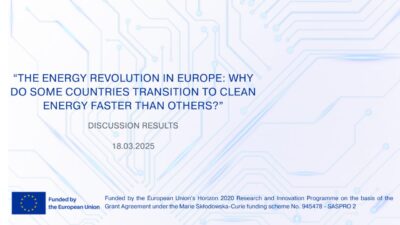On March 18, 2025, an open online lecture by Ihor Vakulenko, PhD in Economics and researcher at the Institute of Economic Research of the Slovak Academy of Sciences, addressed current issues of the energy transition in EU countries. The event brought together more than 50 participants—students, lecturers, and researchers interested in sustainable development and energy security.
The lecture was based on research conducted within the SASPRO 2 program (Marie Skłodowska-Curie Actions), funded by the EU, and provided a comprehensive analysis of the drivers behind the development of clean energy and smart grids in EU member states. In particular, it showed that the Human Development Index is the strongest positive factor in the transition: each standard deviation increase in HDI is associated with a 5.32 percentage point rise in the share of alternative energy. At the same time, countries with higher energy consumption tend to have a lower share of renewables in their energy balance, creating additional challenges for highly developed economies. The impact of CO₂ emissions proved heterogeneous: for countries with a low level of RES deployment (below 20%) it is not decisive, whereas for those with a medium level (20–40%) it becomes critically important.
A separate part of the lecture focused on differentiated approaches to energy policy. Participants actively discussed how European experience could be adapted to the Ukrainian context, particularly in the post-war reconstruction of energy infrastructure.
The speaker emphasized that the findings point to the need to account for each country’s unique context when designing energy transition strategies, rather than relying on one-size-fits-all solutions.
Funded by the European Union’s Horizon 2020 Research and Innovation Programme on the basis of the Grant Agreement under the Marie Skłodowska-Curie funding scheme No. 945478 – SASPRO 2. Views and opinions expressed are however those of the author only and do not necessarily reflect those of the European Union or European Education and Culture Executive Agency. Neither the European Union nor the granting authority can be held responsible for them.

